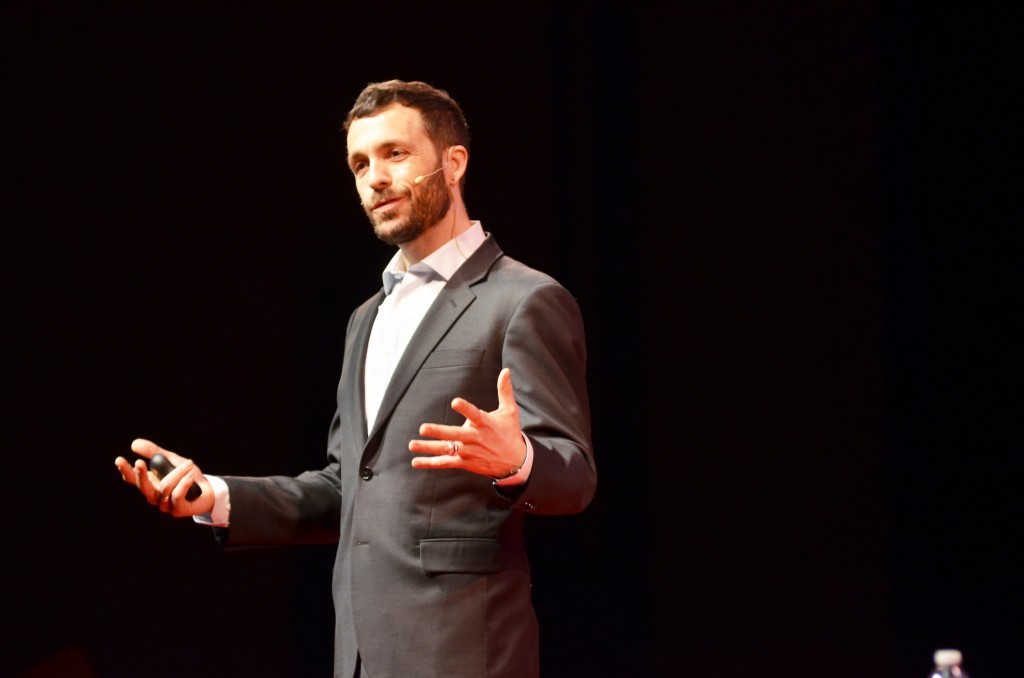
TEDxBinghamton University 2014 presented a packed Osterhout Concer Theater with topics ranging from digital currencies to the algorithms of romance, challenging students to “stray the course.”
Mathematician Hannah Fry, actor Ruben Santiago-Hudson, drug policy advocate gabriel sayegh (who chooses not to capitalize his first or last name), entrepreneur Sebastian Walker, engineer Jeff Garzik, editor Anna Holmes and doctoral candidate Ben “Unidan” Eisenkop shared their ideas with the audience. The Binghamton Crosbys provided a musical interlude.
This year’s theme was ‘straying the course.’ All of the speakers’ topics touched on ideas involving innovative technologies and thinking, like Garzik’s discussion on Bitcoin as the newest advent of the internet, or sayegh’s insight on reforming drug policy.
“The speakers were unbelievable,” University President Harvey Stenger said at intermission. “From drug addiction to new currencies … it’s just things you would’ve never heard in a normal conversation, if you watched every channel on television all day long, you would not have heard what you heard in the last hour and a half.”
TEDxBinghamtonUniversity was organized by students Stephen Prosperi, Stephanie Izquieta and Gina Kim, along with a team of volunteers.
Holmes talked about protesting media stereotypes by quitting her job at prominent women’s magazines such as “Elle” and “InStyle” to begin the alternative women’s blog “Jezebel.” Actor and alumnus of the class of ‘78 Ruben Santiago-Hudson gave the last talk of the afternoon, focusing on building on the failures of life. Eisenkop detailed the changing climate of funding research, a topic Stenger said could influence the way information is both demanded and received by the public.
“We have so much research for the population but we have this middle person in between, that tries to maximize and broker the population’s ideas and funding,” Stenger said. “Now we can go directly to the population and find out what they want to learn.”
Prosperi, a co-director of last year’s TED talk at BU and a junior majoring in finance and marketing new media as a part of the individualized major program, explained the speaker selection process as a way to expand the breadth of the talks.
“We decided to have seven speakers, and once four or five of them got back to us, we decided that that ‘straying the course’ was a theme,” Prosperi said. “If we pick a theme ahead of time, you’re limiting yourself to speakers who fit within that theme, and a school this big with this many majors, I don’t see a point in limiting our theme with speakers of one type when we can hit so many different areas.”
According to Izquieta, a junior majoring in philosophy, politics and law, organizers focused on issues relevant to this generation.
“We look at what’s trending, what’s popular; something that the students are interested in,” Izquieta said. “Drug policy wasn’t a coincidence; it’s something that’s in the news right now, something that’s prevalent in our generation, as voters … We look at speakers who have an idea worth sharing, and something that we want our campus to be exposed to, that might not have been there before.”
George Bishai, a junior majoring in political science, agreed that the talks addressed important topics.
“The issues discussed were very thought-provoking and the speakers managed to take some very abstract ideas and simplify them in a way that would relate to your average college student,” Bishai said. “The gabriel sayegh talk about sensible drug policy was definitely the best part of the whole event.”
Tina Williams, a first-year graduate student in public administration, disagreed. She said that she found the quality of some of the talks to be lacking.
“I thought it was so-so,” Williams said. “It could have addressed more substantial issues. Especially Walker, they sold his topic as some secret all important issue, and it was about cricket. Like are you kidding? The way he connected it to apartheid was insulting. It solves racial disparities when you’re playing the game, sure, but what about after?”
Williams also said she was dissatisfied with the explanations of some of the new technologies.
“Bitcoins have potential, but the way he presented it was really dry,” Williams said. “I also didn’t understand when he used the argument that 80 countries don’t have access to credit cards for Bitcoin promotion; they probably don’t have access to Internet either. He made himself and the idea more self-important.”
According to Student Association Executive Vice President Samson Widerman, the group that runs TEDxBinghamtonUniversity is part of the Philosophy of Science club, and the event itself is sponsored by an array of different organizations on campus. These include the Office of the President, the Alumni Association, the Political Science department and the Office of the Vice President for Research, Widerman said.
“We hope the attendants get inspired. We want them to realize that straying the course is okay,” said Kim, an organizer and a junior majoring in neuroscience. “And I hope that everyone in the audience got a little taste of that, and wants to hone in on it, and stray the course themselves.”


